
The question of luxury and its corre-lation—supposed or real—with decadence is an age-old philosophical and historical debate. Jean-Jacques Rousseau, for example, a Geneva citizen and, incidentally, the son of a watchmaker, believed that luxury was the cause of the decline of the ancient Greek and Roman civilizations. “What, then, is precisely the issue in this question of luxury?” Rousseau asked, then answered himself, “To know which of the following is more important to empires: to be brilliant and momentary or virtuous and lasting.”
Rousseau’s old rival, Voltaire—who created a watch manufacture in Ferney, not far from Geneva—proclaimed just the opposite, “I love luxury, and even indolence, all pleasures, all the arts . . . the superfluous, a very necessary thing.”
The controversy of luxury—some believe it is the source of decadence while others believe luxury is the source of nations’ prosperity—is strangely making a comeback these days. But at a time when ‘mass luxury’ reigns supreme and when global luxury brands have become ‘democratized’, it is not so much ‘luxury’ itself that is being denounced, as it is the excesses of luxury. One word, all by itself, brings into focus the ‘harmful’ overabundance and excess of luxury: bling.
The word is on everyone’s lips, especially now in France, where the nation has discovered that it is being led by ‘President Bling-Bling’. Created by the Afro-American rappers who proudly displayed on their wrists and around their necks the heaviest and the noisiest (hence ‘bling-bling’) luxury hardware they could find, ‘bling’ became the symbol of their new prosperity. In France, however, ‘bling’ is currently being used to characterize the great taste for luxury by its President, Nicolas Sarkozy, a ‘parvenu’ to power. At a time when the nation’s economy is weak, when its expected growth has not materialized, and when the numbers of ‘working poor’ are increasing, the French public has a great deal of trouble accepting the yacht trips, the dream vacations and the expensive watches of their ‘President Bling-Bling’. ‘Bling-bling’ has become the rallying cry of Sarkozy’s opponents and the sound of his dizzying fall in popularity. Has ‘bling’ become the symptom of unacceptable arrogance?
A number of signs indicate that the pendulum is perhaps swinging back, at least in the wealthier occidental countries. Ostentation and excess seem to be slowly ebbing, in favour of a return to more classicism, restraint, rigour, and (apparent) modesty. The ‘Hummer’ watches will inexorably lose ground when faced with the ‘Nano’ timepieces, if we can draw a parallel with the automobile world, which is experiencing the same type of drop. While it is obvious that the trend towards lighter and more fuel-efficient cars is above all an environmental necessity, this same ecological need and the combat against the ‘superfluous’ are becoming the dominant ideologies that are spreading to all sectors of human activity.
Having said all that, though, ‘bling’ still has a good many days ahead of it. Like the rappers who have risen from their miserable ghettos, the ‘emerging economies’ of China, Russia, and India are rising from their endemic poverty and also want to show off their new prosperity. For the nouveaux riches of these countries, concerns for the environment, the philosophy of restraint, and the exigency for ‘durable’ development are ‘luxuries’ that they feel they cannot afford at this time. It seems that one is always the ‘bling’ of somebody else.
Source: Europa Star April-May 2008 Magazine Issue





